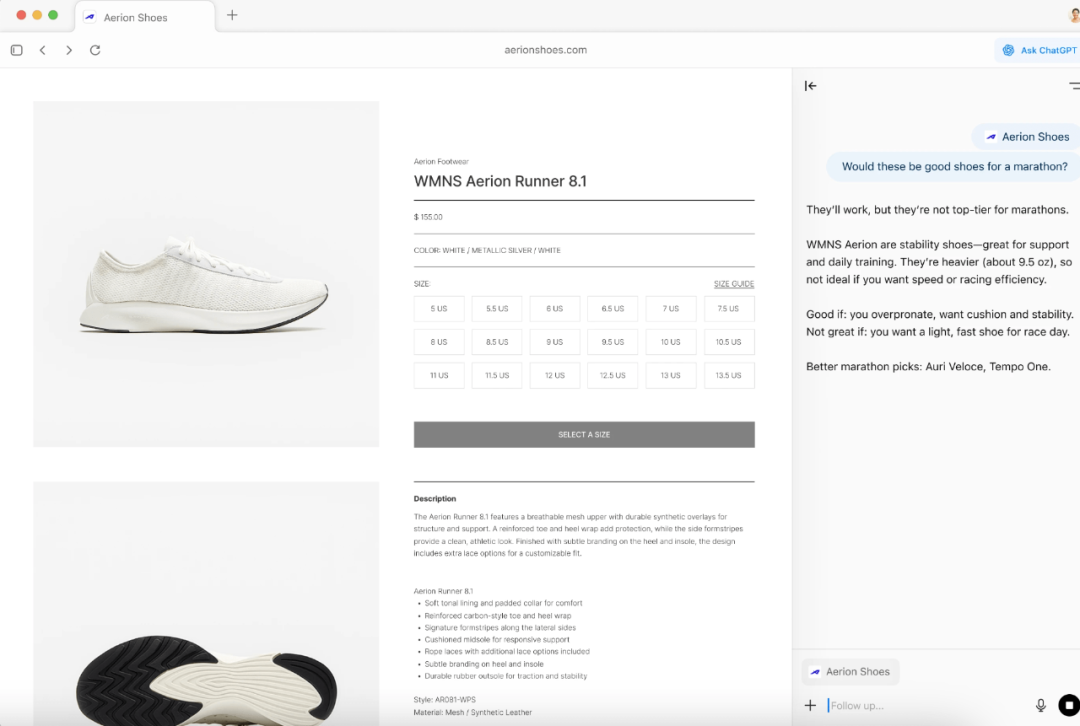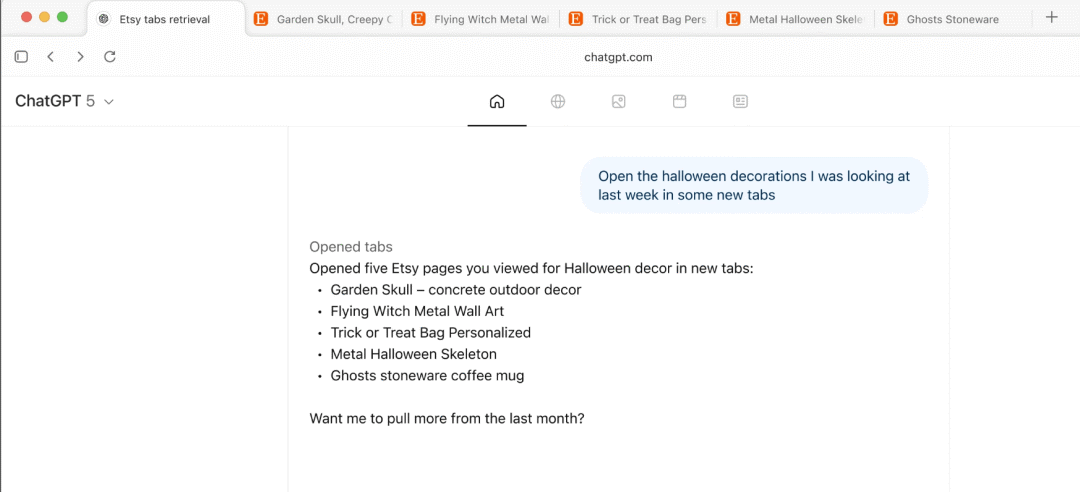OpenAI Sets Sights on Surpassing Chrome, Kicking Off with 'No More Copy-Paste'
![]() 10/22 2025
10/22 2025
![]() 438
438
Opening a browser to view course PowerPoint presentations and then switching to ChatGPT to ask questions; trawling through browsing history to copy job postings into a chatbox; searching for reviews and filling in details to book a restaurant for a dinner party – the "fragmented" experience of using browsers and AI could soon come to an end with ChatGPT Atlas.

On October 21, 2025, OpenAI dropped a bombshell announcement: Atlas, a native browser centered around ChatGPT. It's not merely about adding an AI plugin to Chrome or a web-browsing button to ChatGPT; instead, it seamlessly merges the "chatbot" and "browser" into a single, cohesive entity. This "unorthodox" design might just address the most significant pain point in AI-tool integration today – the constant disruption of context.
Atlas's Three "Counterintuitive" Designs: Not Just Adding Features, But Reconstructing Logic
Most browsers incorporate AI in a "piecemeal" fashion, such as Chrome adding a Gemini sidebar or Perplexity Comet summarizing answers. However, Atlas takes a completely different approach – it aims to make ChatGPT the "operating system" of the browser, rather than just an "add-on."
1. Sidebar + Cursor Chat: Eliminating the Need for "Copy-Paste"
"Previously, I had to take screenshots of PPTs to send to ChatGPT; now it knows exactly what I'm viewing." This feedback comes from Yogya Kalra, a college student and early tester. Atlas's core innovation lies in tightly integrating ChatGPT's chat window with webpage content: whenever you open a page, the sidebar ChatGPT automatically captures the current context, eliminating the need to manually copy text, upload images, or paste links.
Even more refined is the "cursor chat" feature – select a sentence in a document, click a button, and ChatGPT can directly modify or interpret it. For instance, it can streamline convoluted sentences in emails or explain unfamiliar terms on webpages with a single click. This "click-and-interact" approach condenses the previous three-step process of "switching windows - transferring information - waiting for a response" into just one step.
2. Browser Memory: From "Forgetting" to "Proactively Connecting the Dots"
Ordinary browsers store history as a list of static URLs; Atlas's "browser memory," however, acts as a "context library" that ChatGPT can comprehend. You can ask it, "Compile all job postings I viewed last week into an industry trends table to help me prepare for interviews" – it will automatically link the job pages you browsed without the need for manual filtering.
OpenAI is clearly aware of privacy concerns: this feature is opt-in by default, and all memories can be viewed, archived, or deleted in the settings. Deleting browsing history also removes related memories. However, the question lingers: when browsers start "remembering" your work, shopping, and even reading habits, will they become "super assistants" or "personal surveillance"? This line must be drawn by users themselves.

3. Agent Mode: From "Helping You Think" to "Helping You Act" (But Only for Paid Users)
Atlas's most "ambitious" feature is "Agent Mode" – tell it to book a restaurant, and it will open reservation sites, filter ratings, and fill in your preferences; ask it to organize a competitor report, and it will automatically visit company websites and download financial summaries. However, this feature has two limitations: it's currently only available to Plus, Pro, and Business users, and OpenAI admits "complex tasks may still fail."
TechCrunch tests reveal that Agent Mode handles simple tasks like "adding to cart" or "summarizing news" well, but struggles with complex workflows like "comparing flights across websites + syncing calendars," often getting stuck during login or missing information. This highlights a common issue with AI browsers: their ability to "act on your behalf" depends on websites allowing AI to "understand" their pages – OpenAI has already called on developers to add ARIA tags, otherwise Agent Mode will be "powerless without ingredients."
AI Browser Wars: OpenAI's Cards and Competitors' Strategies
Atlas isn't the first to venture into AI browsers. As early as summer 2024, Perplexity launched Comet, focusing on "delivering answers directly instead of links"; Google also announced in September 2025 that it would deeply embed Gemini into Chrome, claiming to help users "automatically order coffee and schedule doctor appointments." However, OpenAI's entry has reshaped the competition.
Competitors' Strengths: Speed or Stability
Perplexity Comet's core strength lies in its "answer engine" – searching "2025 EV sales" won't yield 10 links but a summarized report, even scanning your open tabs for context. This "fast and precise" style appeals to users tired of Google's "overly complex" search results.
Chrome's moat has never been feature abundance but "ecosystem inertia." Its 3 billion users' bookmarks, passwords, and plugin ecosystems can't be disrupted by a single AI feature. Google's strategy for adding Gemini to Chrome is "seamless integration" – for example, while viewing emails in Chrome, Gemini can directly generate schedules without switching apps.
OpenAI's Advantage: Not a "Browser," But a "ChatGPT Ecosystem Gateway"
Atlas's real strength isn't outperforming Comet in answer summarization or Chrome in features, but its integration with ChatGPT's "memory ecosystem." Content discussed in Atlas and pages browsed can directly link to your past ChatGPT conversations – for example, if you discussed "how to write a product manager resume" with ChatGPT last month, Atlas will now automatically remind you to "highlight project experience" when viewing job requirements.
This "cross-scenario memory" is unique to Atlas. Comet's answers, however fast, are "one-time"; Chrome's Gemini, however seamless, stays within browser boundaries. Atlas aims to make the browser part of ChatGPT's "super assistant" ecosystem – where browsing, chatting, and task completion all flow within a single ecosystem.
Can Atlas Rewrite Browser Rules?
Despite OpenAI's hype, Atlas faces three hurdles to overthrow Chrome.
1. Cross-Platform Delay: Missing the "First Wave of User Habit Formation"
Currently, Atlas only supports macOS; Windows, iOS, and Android will follow "later." Browser user loyalty heavily relies on "multi-device sync" – using Atlas on a computer but Chrome on a phone creates friction that may deter users. By the time Atlas rolls out globally, many may have already settled into Comet or Chrome Gemini.
2. Privacy: A Double-Edged Sword – The More Useful "Memory," the Greater the Concern
While Atlas lets users control "browser memory," when AI starts linking visited medical pages or financial sites, data security fears escalate. OpenAI claims "not to train models on browsing content," but will users believe it? Especially enterprise users – might they reject Atlas for work due to data leak concerns?
3. Agent Mode's "Ceiling": Depends on Developer Buy-In
For Agent Mode to work effectively, website developers must add ARIA tags – otherwise, AI can't understand page buttons or forms and can't "act on your behalf." If developers resist (e.g., e-commerce platforms fearing AI impact on conversion rates, financial sites worrying about security), Agent Mode will be limited to simple tasks and fail as a "killer feature."
The "AI-Native" Browser Era Has Just Begun
Atlas's launch isn't so much OpenAI declaring war on Chrome as redefining browsers – from "tools to open webpages" to "assistants to complete tasks." This shift, akin to the iPhone redefining phones in 2007 or Chrome redefining browsers in 2010, may mark the start of a new cycle.
However, Atlas's success depends not on how smart its AI is, but whether it solves "true user laziness" – no need to remember URLs, copy-paste, or switch between apps. Defeating Chrome remains uncertain – after all, users find switching browsers after a decade harder than switching phones.
Over the next six months, three areas warrant attention: the experience of Windows and mobile versions, developer acceptance of ARIA tags, and whether Google will accelerate more aggressive AI features for Chrome. The AI browser war has only just sounded its first drumbeat.








